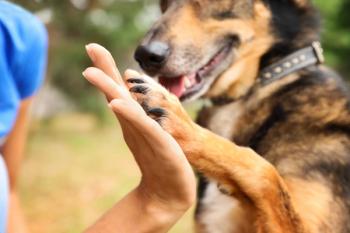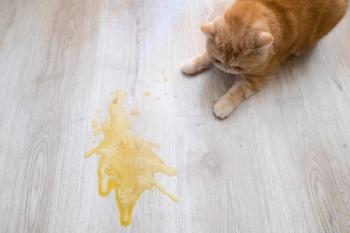
Pets and Vets: Golden retriever enrollment continues for CSU veterinary lifetime cancer study
State roundup: A look at the world of veterinary health.
Approximately 500 golden retrievers are enrolled or in the process of enrolling in the Golden Retriever Lifetime Study with Colorado State University veterinary oncologist Rodney Page, DVM, DACVIM, director of the Flint Animal Cancer Center. Page hopes to enroll 3,000 dogs during the next two years for his long-term cancer study. Partnered with the Morris Animal Foundation, CSU investigators are currently recruiting young, purebred golden retrievers in an effort to learn more about how to prevent canine cancer and other diseases. "Our hope is that we will be able to identify some significant modifiable risk factors that will improve the health of dogs and potentially provide clues for human health improvement as well," Page says. The study will span 10 to 15 years. CSU claims the study is the largest and longest observational study ever done to improve the health of dogs. For more information or to apply for the study, go to
District of Columbia
The orangutans at the Smithsonian's National Zoological Park are using iPads. Made available through Apps for Apes, an initiative conducted by the conservation organization Orangutan Outreach, the program lets zoo orangutans enjoy 10 different applications that feature cognitive games, drawing exercises, virtual musical instruments and more. It's reported that 36-year-old Bonnie likes to hit the drums, 16-year-old Kyle likes to play the piano and 25-year-old Iris likes the soothing sounds and animated fish swimming in a virtual koi pond. "Apps for Apes fits perfectly in this new era of zookeeping," says Becky Malinsky, great ape keeper at the National Zoo. "It's about changing up the day-to-day lives of our animals. We already vary their food, toys and social interactions every day, but the iPad offers another way to engage their sight, touch and hearing."
Illinois
Shedd Aquarium welcomed a 1-year-and-9-month-old blind sea lion pup in January. The pup, named "Cruz" by aquarium staff, was rescued on a beach in Santa Cruz, Calif., in July 2012. He was found alone, lethargic and blind in both eyes. Veterinary staff say radiographs show metal shards from gunshot wounds in his skull, which likely caused the blindness. Unable to be released back into the wild, Cruz will be receive proper long-term care and the space needed for a permanent home at Shedd.
Kansas
Revenue from new Kansas license plates aim to reduce the stray animal population. "I'm Pet Friendly" license plates will support externships for Kansas State University veterinary students as well as spay-neuter programs at animal shelters across the state, according to the university. The pet-friendly plates require a one-time cost $45.50 and an additional $50 donation annually.
New York
The College of Veterinary Medicine at Cornell University has received a $6 million gift from the Staff Foundation that will fund animal health research with the creation of two new endowed professorships. The college has yet to name specific research to be conducted with the funds, but Dean Michael Kotlikoff, VMD, PhD, has emphasized the school's commitment to advancing canine genetic research. The school also recently received an anonymous gift dedicated to canine genomics research.
North Dakota
Senate Bill 2211, presented to the North Dakota Senate Agricultural Committee in January, seeks to make animal mistreatment—including animal abuse and abandonment—a Class A misdemeanor for a first offense and a Class C felony for a second or subsequent offense within five years. Animal cruelty would be a Class C felony on the first offense. The bill comes in the wake of the voter-defeated Measure 5, which sought to make aggravated acts of animal cruelty against a cat, dog or horse a felony. Sen. Tim Flakoll, R-Fargo, has partnered with North Dakotans for Responsible Animal Care in support of the bill. Supporters hope there is a better chance for passage since SB 2211 covers all animals and spells out specific exceptions including "usual and customary" practices in production of agriculture, animal shows, rodeos and other practices.
Vermont
According to a study released by the American Veterinary Medical Association (AVMA), Vermont has the highest percentage of pet owners. With a population of more than 600,000 people, Vermont sees 71 percent of residents owning at least one pet. Vermont also has the highest rate of cat ownership at 50 percent. Dog ownership came in at 38 percent, not enough for top billing—that went to Arkansas—but it was more than the national average of 37 percent. The survey can be found in the AVMA's current U.S. Pet Ownership and Demographics Sourcebook available at
Wyoming
The Bureau of Land Management (BLM) High Desert District has postponed scheduled field trips, wild horse adoption and the reopening of the Rock Springs Wild Horse Holding Facility in Rock Springs, Wyo., after approximately 30 percent to 40 percent of its weanling wild horses were diagnosed with strangles during a routine veterinary checkup. According to a BLM release, the bacterial infection causes fever, runny nose, swollen or enlarged lymph nodes and even abscesses in the neck and throatlatch. The adoption events were postponed to reduce the stress on the wild horses while they are sick. The school tours, preview day and wild horse adoption will be rescheduled for March 6-9. The Rock Springs facility has been closed since October for horses to receive veterinary evaluation.
Newsletter
From exam room tips to practice management insights, get trusted veterinary news delivered straight to your inbox—subscribe to dvm360.




